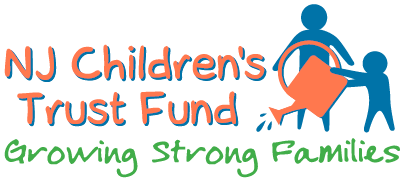The New Jersey Department of Children and Families (DCF) promotes excellence in child welfare practice through its ongoing commitment to continuous quality improvement (CQI). DCF’s commitment to CQI is embedded in its work and the structure of its divisions and offices. DCF has developed and employs systems to support its ability to self-analyze and self-correct and become a learning organization.
What is Continuous Quality Improvement?
CQI is the process of identifying, describing, and analyzing strengths and problems and then testing, implementing, learning from, and revising solutions [1]. CQI is a pro-active, positive management approach that believes practices and processes can always be made better. CQI is dependent on the inclusion and participation of stakeholders, including agency staff, children, youth, families, community partners, law enforcement, judges, and court advocates. DCF’s Office of Performance Management and Accountability (PMA) applies the collective knowledge and experiences of stakeholders to advance learning and execute CQI activities throughout DCF.
[1] Reference. Using Continuous Quality Improvement to Improve Child Welfare Practices, Casey Family Programs and National Child Welfare Resource Center for Organizational Improvement, May 2005.
What are the goals of CQI?
- Create a continuous learning environment to improve future outcomes;
- Ensure sustainability of DCF’S case practice model and reform efforts;
- Improve agency processes, procedures, and quality of services by using data to guide fiscal and programmatic decision-making; and
- Sustain and enhance DCF’s ability to self-monitor.
DCF is implementing the CQI plan in phases and will continue to update it on an ongoing basis. The initial CQI plan document focuses primarily on DCF's case practice service delivery. However, DCF has developed a framework and is in the process of and committed to developing a CQI system that can be generalized to our work in all divisions within DCF and with external providers.
CQI Framework
How We Get It Done
Our Staff
Our Use of Data
Our Partnerships
CQI Summit
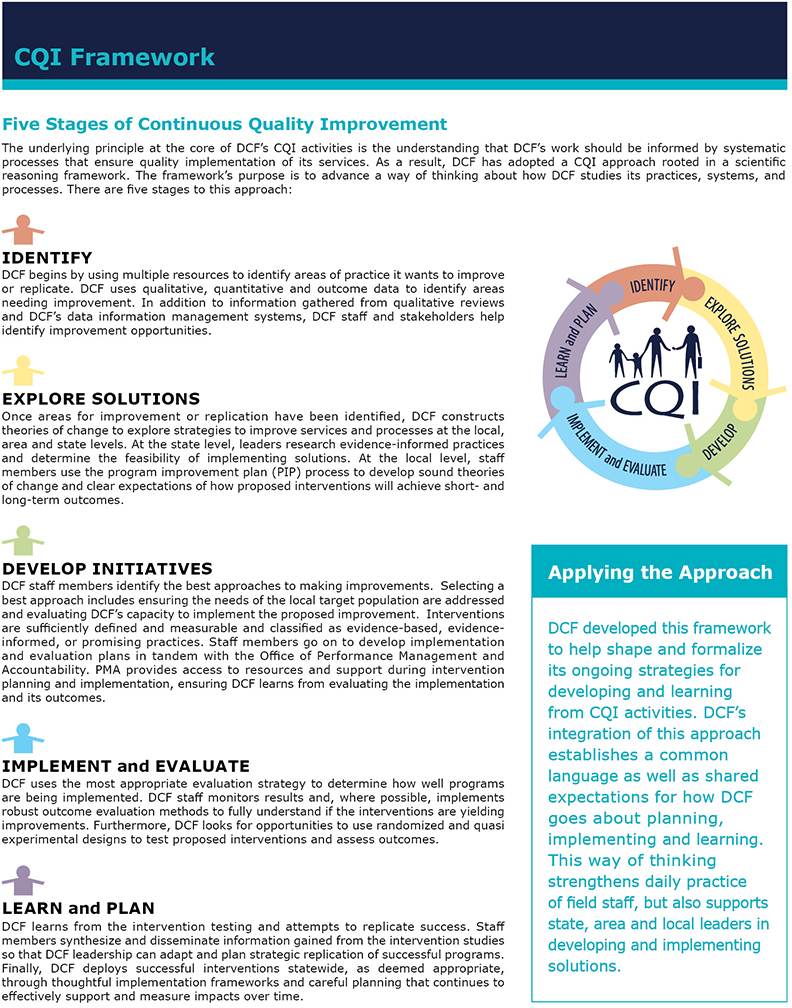

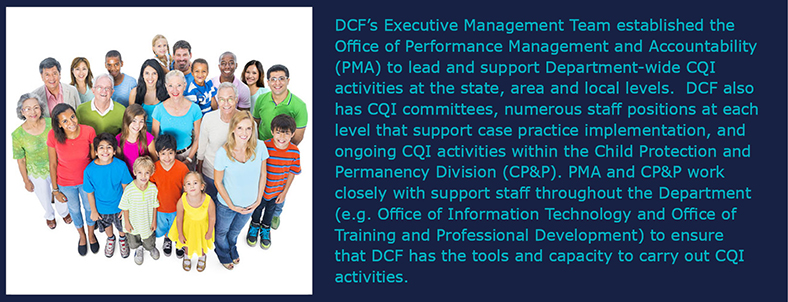
DCF Executive Management
The DCF Executive Management Team is charged with ensuring the DCF mission, vision, values, strategic priorities and strategic goals are upheld. Executive Management uses data from various sources to help guide collaborative efforts, and inform the goals and priorities of the DCF Strategic Plan. Team Members use information from key departmental meetings (e.g., executive case reviews, ChildStat, Quality Review, Manage by Data Fellows reviews) to identify themes and trends among internal CP&P Case Practice, external purchased services, and, at a systems-level, to inform department planning, strategic priorities, and individual efforts within each division. In addition, DCF Executive Management uses data to inform policy, management of the service array, automated system development, training and other supportive systems.
Office of Performance Management and Accountability
The Office of Performance Management and Accountability is committed to ensuring the safety, permanency, and well-being of New Jersey’s children and families. PMA monitors CQI activities related to collecting, organizing, and managing administrative data; aggregating, analyzing and disseminating data to support daily practice; conducting qualitative reviews, monthly ChildStat reviews, case record reviews, and Fatality and Executive Case Reviews; as well as supporting the development and implementation of county level program improvement plans. PMA works with CP&P leadership at various levels to help to organize quality improvement activities at the local offices.
Designated Roles to Support CQI Oversight. DCF believes every staff member plays a critical role in supporting continuous improvement of services. DCF leadership recognizes the importance of maintaining strong oversight to ensure that the CQI system is implemented consistently. DCF has designated staff members who provide oversight and ensure CQI information sharing across all levels of the department. These designated CQI entities and roles include:
- Executive Leadership. Executive Leadership stays informed of CQI activities at every level of the Department and ensures that DCF has the resources and infrastructure in place to carry out formal CQI activities.
- State CQI Steering Committee. The State CQI Steering Committee oversees the continuous development and implementation of DCF’s CQI system and ensures that executive management and state leaders stay abreast of important CQI related information. The committees work to monitor policies, improve documentation of CQI related standards and procedures, support implementation of CQI training and coaching programs, and monitor the implementation of the major components of the CQI plan.
- Office of Quality CQI Liaisons and Team Leads. The CQI Liaisons and Team Leads work closely together to support CQI activities at the local office and area levels across the state. The CQI Liaisons participate in the development of CQI training; provide guidance for the development of local CQI teams; manage the process of synthesizing information gained from the local CQI activities; track the implementation of Steering Committee directives, and communicate results, lessons learned, and recommendations in written and verbal form, as needed, to the CQI Steering Committee and other DCF stakeholders. The Team Leads are responsible for providing technical assistance to support to the local CQI Teams in development and monitoring of the program improvement process.
- Area Quality Coordinators. Nine Area Quality Coordinators manage CQI teams and the program improvement plan process at the county level and ensure that information gained from the local CQI activities is shared with the CQI Liaisons.
- CQI Statewide Collaboration Team. The CQI Statewide Collaboration Team ensures that the CQI communication plan is fully functioning, develops strategies to meet staff training and information needs related to implementing CQI activities and implements and monitors activities that support organizational learning at all levels.
- County CQI teams. The County CQI teams develop, implement and support the evaluation of interventions outlined in the program improvement plans (PIPs). Members of the county CQI teams also share information related to any additional CQI activities with the Area Quality Coordinators.
Division of Child Protection and Permanency
The Division of Child Protection and Permanency (CP&P) is New Jersey's child protection and child welfare agency within the department. Its mission is to ensure the safety, permanency, and well-being of children and to support families. CP&P is responsible for investigating allegations of child abuse and neglect and, if necessary, arranging for the child's protection and a family's treatment. CP&P utilizes the DCF Case Practice Model (CPM), which was developed and published in 2006 and was followed by intensive staff training on the model’s components and immersion training to integrate the model into the practice of every local office. This included coaching and mentoring to reinforce training and build staff competency. There are numerous staff positions at the state (central office), area- and local-levels within CP&P to support CPM implementation and ongoing CQI process and activities.
- CP&P Central Office. CP&P Central Office, led by the Assistant Commissioner, is responsible for leadership, direction, and oversight of case practice. Central Office is also responsible for Central, Area and Local Office staff dedicated to supporting the implementation of the CPM.
- CP&P Area Offices. There are nine CP&P Area Offices throughout the state established to manage and support the CP&P Local Offices in their daily activities and operation. These offices are responsible for managing staff who are designated to support caseworkers at Local Offices and monitoring the ongoing quality of case practice.
- CP&P Local Offices. There are 46 CP&P Local Offices throughout the state established to and responsible for arranging for protection services and providing support to the families. Extensive training, coaching and dedicated staff positions are used to support caseworkers’ effective implementation of the case practice model at the local level.
Office of Information and Technology (OIT)
The Office of Information Technology manages and supports the Department in using the Statewide Automated Child Welfare Information System (SACWIS) as well as all other critical information management systems (e.g. Safe Measures).
Office of Training and Professional Development. The Office of Training and Professional Development partners with leadership throughout the Department to develop curricula and deliver educational training needed to promote continuous quality improvement of case practice.
Office of Strategic Development (OSD)
The Office of Strategic Development (OSD) monitors the quality and effectiveness of programming purchased by the Department. The mission of OSD is to modernize the service array by applying the best available evidence and developing transformational solutions to address the needs of children, youth and families. In close partnership and collaboration with CP&P, PMA and the Office of Contracting, OSD is leading the charge of reviewing and assessing whether core services purchased by the Department are meeting the needs of CP&P involved families.
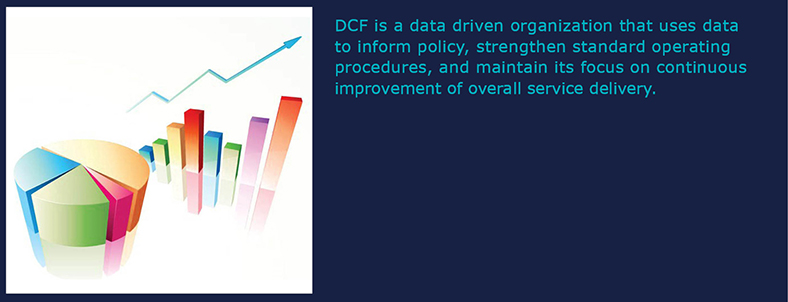
Information Management Systems
DCF has clear processes for collecting and extracting quantitative and qualitative data.
Information management systems include:
NJSPIRIT. The New Jersey Statewide Protective Investigation, Reporting and Information Tool (NJSPIRIT) is DCF’s primary information management system for case practice. It is a comprehensive, automated case management tool that integrates various aspects of case practice in a single statewide system. NJ SPIRIT has several built in validation tools to support data quality, meets federal requirements for a Statewide Automated Child Welfare Information System (SACWIS) and supports several federal reporting systems.
SafeMeasures. The SafeMeasures (SM) system is a software application that feeds data from NJSPIRIT into a user-friendly reporting system. Frontline caseworkers, supervisors, and managers throughout the agency use SM to guide workflow, track timely data entry, data quality, and measure results.
CP&P Longitudinal Outcome Data. DCF contracts with an evaluation, research, and consulting firm, to transform data recorded in NJSPIRIT into longitudinal data reports. The firm provides data via a Statewide and County Workbook. This Workbook is utilized by the DCF Office of Research, Evaluation, and Reporting and available to CP&P management staff. All CP&P managers and key support staff have been trained on the use of the longitudinal outcomes report.
Ongoing Focus on Data Quality
PMA collaborates with leadership throughout DCF to ensure the reliability and validity of data used to inform decision making. DCF has designated staff working to ensure data is inputted, collected and extracted systematically and is committed to providing ongoing training and development opportunities.
- PMA’s Office of Research, Evaluation and Reporting (RER). The RER staff monitors data collected in NJSPIRIT to ensure data is entered accurately and consistently. RER analysts regularly evaluate the data to confirm that the trends that emerge mirror the work of our staff and accurately reflect the experiences of our families.
- The Office of Information Technology (IT). IT staffs a NJSPIRIT Help Desk to address any technical issues related to the use of DCF’s information management systems. IT also participates in mandated systems compliance reviews of NJSPIRIT on behalf of the Department. These reviews are carried out by the Division of State Systems (DSS). The reviews assess DCF’s fidelity to federal requirements and ensure the development of system improvement plans.
- Manage by Data Fellows. DCF’s Manage by Data Fellows Program is a nine-month training program for middle management staff to learn how to monitor and better utilize data to support improved case practice and outcomes for children and families.
- Office of Policy & Regulatory Development. DCF provides guidance to staff through its policies about data entry. These policies identify what needs to be collected and entered in NJSPIRIT. This guidance describes specific content, time frames for completing data entry, and the order in which the certain data fields should be entered. There are hundreds of DCF policies outlining how and when a staff member enters data into the NJSPIRIT system.
- Automated Data Entry Alerts for Case Managers. RER and IT have partnered to develop and continue to monitor functionality within its information management systems that give staff automated prompts to support data entry and, thus, data quality.
- Staff Training. The Professional Training and Development Center trains new and seasoned workers in child protection and permanency practice. In addition to the case practice model curriculum, training includes instruction on how to navigate DCF information management systems and how to develop and maintain automated records management, case planning, service planning, and data tracking. Additional DCF data-related training programs include, yet are not limited to, Data Skills for Supervisors, Documentation for Child Welfare Professionals, Excel Training, New Worker Pre-Service Training, and Qualitative Review training.
Case Record Review Data and Process
PMA’s Office of Quality is committed to conducting ongoing case reviews, analyzing and disseminating performance data, and providing feedback to stakeholders and decision makers that focuses on improving Departmental service delivery and case practice. The Office of Quality leads numerous case reviews that provide an understanding of what is “behind” the safety, permanency and well-being data in terms of day-to-day practice in the field and how that practice is impacting child and family functioning and outcomes.
Example Case Review Tools Include:
- Qualitative Review. The Qualitative Review uses a combination of record reviews, interviews, observations, and professional assessment to identify patterns regarding children, youth, families, and the people who support them. The QR examines the status of the child and family in several important areas of life such as safety, stability, health, and family resourcefulness. The review also assesses practice performance areas such as engagement, teamwork & coordination, ongoing assessment process and case planning.
- ChildStat. ChildStat is an internal case presentation that focuses on the quality of the practice and the services offered to a family. There is a statewide audience from the state, area and local office levels. This forum provides an opportunity for DCF staff to examine practice, policy and procedure from a systems perspective.
- Enhanced Reviews (Fifth and Tenth Month). The fifth month enhanced review is a formal internal review of children, who have been in placement for five months. This review is conducted by the Administrative Placement Reviewer, an independent consultant to all parties. The review focuses on progress made toward the case plan, including the completion of key permanency tasks. Team members such as parents and providers are encouraged to attend. The tenth month placement review is another critical decision-making time in which the agency must assess case progress.
- Executive Directed Case Reviews. Executive Directed Case Reviews are monthly quality case reviews involving executive leadership on a youth identified by the Commissioner, Director of the Division of Child Protection & Permanency (CP&P) or the Director of Children’s System of Care (CSOC). The process of the review entails gathering all relevant and available information to assess the case or clinical practice of the agency or contracted staff.
- Targeted Reviews. DCF conducts targeted reviews to review the quality of specific components of practice. For example, DCF conducts several special reviews of New Jersey Child Protection Services investigative practice to assess the overall quality of practice around CP&P fulfilling its statutorily mandated role to investigate reports of alleged child abuse and neglect. DCF also conducts a special review of the State Central Registry (SCR) to assess the overall quality and effectiveness of the manner, speed, and clarity with which SCR receives, screens, prioritizes, dispatches, and act on calls from the public.
Collaborative Data Analysis
DCF’s leadership collaborates internally as well as with university partners and consultants, external community work groups and systems representatives’ to analyze and interpret data.
- DCF’s Data Analyst and Case Review Team Leads. Data Analyst and Case Review Team Leads in PMA oversee various quantitative and qualitative data collection efforts and conduct analyses to understand the quality of case practice, outcomes for families and key performance indicators (e.g. to parent-child visits, family team meetings, case worker child visits, and supervisory conferencing).
- DCF’s PMA, CP&P Leadership and Executive Management. CP&P and PMA collaborate regularly to support accurate analysis and interpretation of data.
- University Partners and Consultants. DCF contracts with university researchers and consultants from private firms to obtain technical assistance in collecting data and reporting information about our many initiatives and programs.
- System Partners. The Quality Review and ChildStat processes include consensus building and debrief opportunities that allow community stakeholders to participate in the assessment, hear the findings from the review and provide insights to support next steps for case planning.
Dissemination of Agency Level Results
DCF disseminates agency level results for use by a broad range of stakeholders by posting several reports on the DCF Website.
Example reports and resources include:
- Commissioner’s Monthly Report. The Commissioner's Monthly Report is a monthly report of selected data points that supports NJ DCF in understanding who it is serving and how well it is performing. The Commissioner's Monthly Report helps guide NJ DCF efforts as it strives daily to fulfill its department-wide vision and mission.
- New Jersey Child Welfare Data Information Portal. The Data Portal makes New Jersey Child Welfare data available to the public, and allows users to explore key indicators of child welfare through customizable visualization and query tools.
- Screening and Investigation Report. The Screening and Investigation reports use New Jersey State Central Registry Activity data (e.g. monthly number Child Abuse and Neglect Hotline calls) and reports on annual trends, assignments by county, and the referral sources.
- Data Fact Sheets. The fact sheets provide information and data regarding DCF’s efforts to collaborate with stakeholders and community partners and to enhance the effectiveness of communication with employees, partners, the media and the general public. All data facts sheets can be found on the New Jersey DCF public web site. Some examples of data information sheets include, yet are not limited to, the following:
- Family Success Centers (FSCs)
- Office of Adolescent Services Safe Space Program
- County Inter-Agency Coordination Councils’ (CIACC) Educational Partnerships
- Adolescent Housing HUB- The Adolescent Housing Hub (AHH)
- Scholarship Programs for Post-Secondary Education
- Responsible Fatherhood/Batterers Intervention Program
- Interstate Compact and Interstate Services Office
- Help Me Grow
- Children’s Interagency Coordinating Council Summary of Activity. The Children’s Interagency Coordinating Council Summary of Activity report provides data on caller information (e.g. demographics, reasons and resolutions for calls), as well as information regarding services provided to active youth (e.g. referrals, Out-of-Home Treatments, I/DD services, and substance abuse services).
- DCF Needs Assessment Report. The needs assessment not only provides the data for DCF to understand the needs of children, youth, and families, but prioritizes needs for implementing actionable change to enhance the current service array.
- Educational Stability for Children in Foster Care. The educational stability reports on the stability (defined as remaining in same school or changing schools) of eligible children by age of child, county, and reasons for school change.
- Annual Child Abuse and Neglect Report. The Annual Abuse and Neglect Report looks at the rates of established/substantiated abuse and neglect by quarter, year, county, municipality, type of maltreatment, and age of child victim. The report also looks at the rates of institutional abuse and neglect by county and facility type.
- Child Protection & Permanency Quarterly Demographic Summary. This report provides the demographics of those receiving in-home and out-of-home placements (e.g. county, age, race, ethnicity, gender, type of placement).
- DCF Workforce Report. This report summarizes the demographics and characteristics of the current child welfare workforce and highlights a variety of indicators of effective workforce planning and development.
- Safe Haven Surrenders. This report compares Safe Haven surrenders and Unsafe Abandonments by year.
- Federal Performance Measures. The U.S. Department of Health and Human Services, Administration for Children and Families (ACF), Children's Bureau utilizes data submitted by the 50 States, Puerto Rico and the District of Columbia to provide reports on child protection and child welfare programs across the Country. NJ DCF shares this information on the NJ DCF website to provide information both on New Jersey's performance, and also to provide a national comparison.
- Child Fatality and New Fatality Review Board (CFNFRB) Annual Reports. This report summarizes the work of the CFNFRB, which reviews fatalities and near fatalities of children in order to identify their causes, relationship to governmental support systems, and methods of prevention.
- New Jersey Domestic Violence Fatality and Near Fatality Review Board (DVFNFRB). The Reviews and Recommendations report summarizes the work of the DVFNFRB, who reviews the facts and circumstances surrounding domestic violence-related fatalities and near fatalities in New Jersey in order to identify their causes and their relationship to government and nongovernment service delivery systems, and to develop methods of prevention.
- Child and Family Services Plan (CFSP)/ Annual Progress and Services Reports (APSR). The CFSP is a strategic plan that sets forth a vision and goals to strengthen NJ DCF. It outlines initiatives and activities that will carry out over the next 5 years to administer and integrate programs and services to promote the safety, permanency, and well-being of children and families. The Annual Progress and Services Report (APSR) provides an annual update on the progress towards the goals and objectives in the CFSPs and outlines the planned activities for the upcoming fiscal year.
- New Jersey Task Force on Child Abuse and Neglect-Annual SORS (Staffing and Oversight Review Subcommittee) Report. This report summarizes the work of SORS, which is to review CP&P staffing levels in order to develop recommendations for effective methods of recruiting, hiring, and retaining staff within CP&P.
- New Jersey Task Force on Child Abuse and Neglect (NJTFCAN) Report. The purpose of this report is to summarize the work of the NJTFCAN, which is to study and develop recommendations regarding the most effective means of improving the quality and scope of child protective and preventative services provided or supported by State government.
- State of New Jersey Transparency Center-Governor’s Performance Center. This report provides the quarterly progress on key performance indicators, comparing the data with the previous quarter and 12 month average.
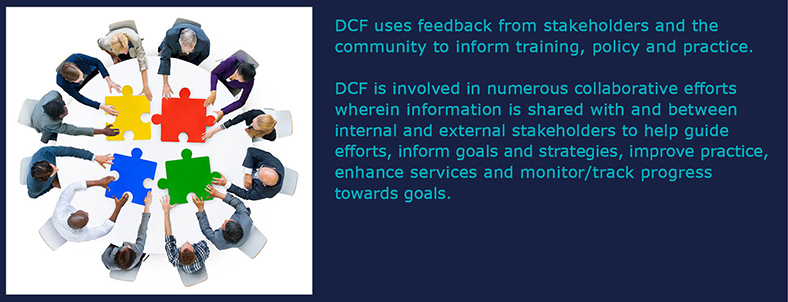
Examples of collaborative efforts include:
- HSAC - Human Service Advisory Councils. In each county, a HSAC reviews county level human service activities and serves as the primary vehicle for making local recommendations to assist both county governments, the New Jersey Department of Human Services and DCF in decision-making.
- Children’s Inter-Agency Coordinating Councils. The Children’s Inter-Agency Coordinating Councils (CIACC) serve as the mechanism to develop and maintain a responsive, accessible, and integrated system of care for children with special social, emotional and behavioral needs.
- Youth Advisory Boards. DCF’s Youth Advisory Boards consist of current and former foster youth who gather and discuss how to improve the policies, procedures and services provided by DCF.
- Children in Court Improvement Committee. The Children in Court Improvement Committee (CICIC) allocates and administers federal grants for Children in Court Improvement projects affecting the lives of children in foster care.
- Advisory Council on Domestic Violence. The twenty-member Advisory Council on Domestic Violence is appointed by the Governor and represents government and non-profit groups. The council is charged with studying needs, priorities, programs, and policies throughout the State; ensuring that service providers and community organizations are aware of needs and services; making recommendations for community education and training programs; monitoring the effectiveness of laws concerning domestic violence and making recommendations for their improvement.
- Domestic Violence Fatality and Near Fatality Review Board. The Board’s primary objectives are to identify domestic violence related fatalities and near fatalities; engage in quantitative and qualitative reviews of statewide fatalities; and recommend system changes in order to promote victim safety, offender accountability, and work towards prevention of domestic violence fatalities.
- Child Fatality and Near Fatality Review Board. The Child Fatality and Near Fatality Review Board members are appointed by the Governor and have expertise or experience in child abuse. The purpose of the Board is to review fatalities and near fatalities of children in order to identify their causes, relationship to governmental support systems, and methods of prevention.
- New Jersey Task Force on Child Abuse and Neglect. The purpose of the New Jersey Task Force on Child Abuse and Neglect is to study and develop recommendations regarding the most effective means of improving the quality and scope of child protective and preventative services provided or supported by State government.
- Governor’s Advisory Council Against Sexual Violence. The multidisciplinary Governor’s Advisory Council Against Sexual Violence is comprised of governmental and non-governmental members from across the State, who are charged with reviewing and recommending policies, procedures, protocols, legislation, trainings, and standards related to sexual violence and recommending solutions for the prevention of sexual violence.
- New Jersey Advisory Commission on the Status of Women. The Commission is composed of eleven members appointed by the Governor. The Commission advises elected officials and the DCF Division on Women regarding issues affecting women; acts as a resource for municipal, county, and local commissions and for women’s organizations throughout the State; and empowers women through partnership, programming and publicity.
- Youth Suicide Prevention Advisory Council. The Youth Suicide Prevention Advisory Council meets regularly to examine existing needs and services and makes recommendations to DCF for youth suicide reporting, prevention, and intervention.
- Staffing and Oversight Review Subcommittee (SORS). The New Jersey Task Force on Child Abuse and Neglect Staffing and Oversight Review Subcommittee (SORS) reviews staffing levels of CP&P and develops recommendations regarding the most effective methods of recruiting, hiring, and retaining staff within the organization.









